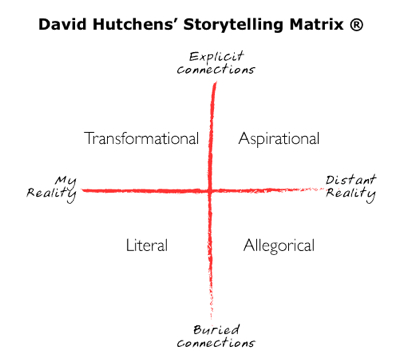Why have I never encountered David Hutchens until recently? I was captivated by his article, Applications of Narrative and Storytelling as an Organizational Discipline; or Why Organizational Communication in the 21st Century May Find its Salvation in Talking Animals, which he initially created for the 10th Anniversary Edition of Outlearning the Wolves, one of his series of Learning Fables.
Why did this piece knock my socks off?
- Because it is exceedingly well written.
- Because it weaves didactic and essay-like writing with actual stories.
- Because it presents brilliant ideas.
This piece is just the tip of the iceberg in terms of what Hutchens offers those interested in organizational storytelling and related concepts. He presents the article, Telling Stories, Making Meaning, his Learning Fables, simulation games with story elements (used to teach management concepts), and a charming story of himself and his career.
But let’s talk a bit about Applications of Narrative and Storytelling as an Organizational Discipline; or Why Organizational Communication in the 21st Century May Find its Salvation in Talking Animals.
Hutchens talks about how hard it is for corporate types to tell stories (“Storytelling is innate and intuitive, and yet I encounter a lot of people who feel anxious about it.”) and speculates on the reasons:
So what is it about the corporate setting that often makes it an inhospitable environment for narrative? Would telling stories simply have taken too long for this group of time-crunched executives or perhaps left them too emotionally vulnerable? Would their open-ended tales from the trenches have been too ambiguous for a culture that demanded precision and correct answers? Or have the PowerPoint body snatchers finally assimilated all of us so that we can now speak only in bullet-pointed reductionism?
One of the sticking points, Hutchens notes, is anxiety over which is the right story to tell. That’s where his Storytelling Matrix comes in. He describes four kinds of stories (read the article to learn the role of the storyteller, role of the audience, and examples for each of these four):
- Literal Stories: Descriptive stories that exist in the present reality with buried connections.
- Allegorical Stories: Stories that take place in a distant reality and have buried connections. They include fairy tales and movies such as Star Wars.
- Transformational Stories: Stories that take place in the present reality with the connections made explicit.
- Aspirational Stories: Stories in a distant reality with the connections made explicit.
I highly recommend you read Hutchens’s article and spend some time poking around his site.
